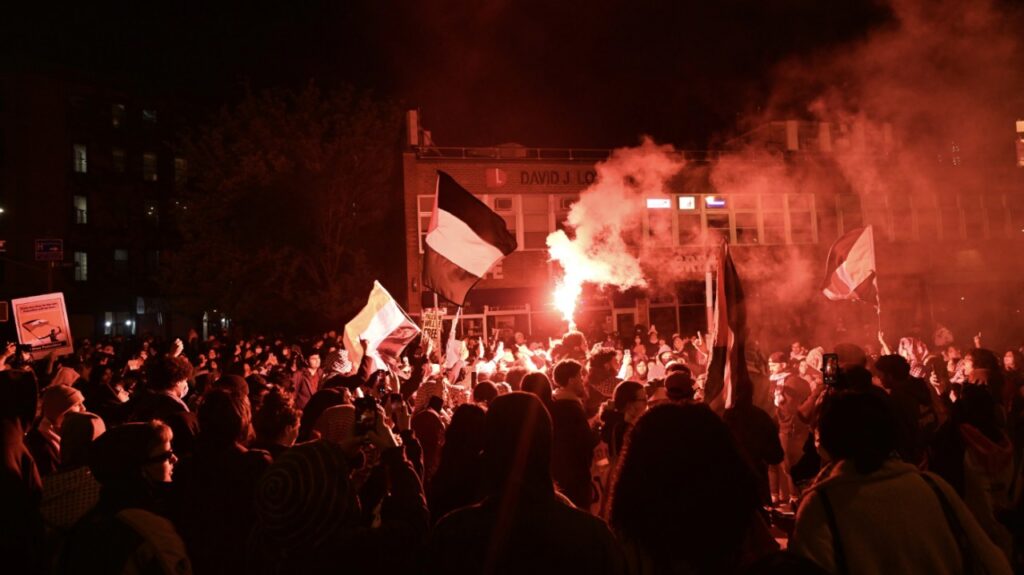Monday started off uneventfully at New York University, where I am a faculty member at the medical center.
Unlike many other major universities, New York University does not have a central campus. When it comes to the volatile demonstrations happening here, at Columbia University, and across the country, the encampment's lack of a central gathering point is actually an advantage. Many New York University students consider Washington Square Park to be green, even though it is public property patrolled by police. Previous dueling demonstrations by Palestinians or Israelis in the park have been largely peaceful.
Unfortunately, during recent protests, the police have had to go to great lengths to maintain order and should be recognized for their efforts. The NYU administration should also be commended for quickly involving the police to keep students safe. The pro-Palestinian protest was held in Gould Plaza outside the Stern Business School and was initially barricaded. But when they spread and became more threatening, reportedly incited by professional agitators, police intervened.
The right to protest is not an issue. The problem is when, like at Columbia and Yale, these protests create a threatening atmosphere that makes more students feel unsafe on campus. Columbia University suspended in-person classes on its main campus last Monday and transitioned to hybrid distance learning for the remainder of the semester later that week. It is a sad and alarming event.
At New York University, police locked down the campus and arrested more than 100 protesters as bottles were thrown Monday night. Classes continued on Tuesday morning, even though a group known as NYU Palestine Solidarity Coalition struck classes in complete disregard for the quality of education students were receiving. Despite police intervention, students desperate to learn are now afraid to go to class.
Still, for now, classes are being held in public and in-person, with protests and arrests spreading to universities across the country, which is commendable.
NYU has made ongoing attempts to center the conversation and move it away from hate and intimidation. President Linda Mills kept the Tel Aviv campus open despite massive protests. This allows students to learn from the realities of wartime life, which is fundamental to education. New York University also announced this year the opening of a Center for the Study of Antisemitism to study the causes and manifestations of this hatred and other forms of prejudice. This is extremely important, and New York University is well-positioned to accomplish this because of its Department of Religious Studies and History. The museum's first director, Abinoam Pat, is a prominent scholar of the Holocaust and Israel.
With a law degree, a doctorate in health policy, and a degree in social work, Mr. Mills is equipped with the tools to deal with these difficult times. Her career as a filmmaker is also relevant, particularly her first moving film, which follows in the footsteps of a family fleeing the Holocaust, and an award-winning portrayal of a rabbi and imam working together to spread acceptance throughout their community. The historical film “Of Many'' is particularly important. in New York City.
We certainly need that feeling and understanding right now. Mills said this at a conference at Hunter College last month. “Really, what is needed in this time is a sense of bringing our world back together again,” and “that path requires opening up many of our hearts, minds, and capacities” to each other. Something to say. ”
I grew up Jewish in New York City, and I don't remember encountering this much anti-Semitism here or at Brown University, where I attended undergraduate school. This impulse toward criticism and dehumanization now seems to be proliferating, fueled by demagogues and reminiscent of other times in history and other countries such as the Soviet Union. We could definitely do better here. Our country was founded on the principle that we can and must do better.
Education is supposed to give us the tools to understand each other's perspectives. Protests that spew hatred and dehumanize others are the opposite. We must resist now before it is too late and preserve our education system, even if it means using police and other law enforcement agencies to restore order. We also need the regional and national leadership that President Mills provides at NYU.
Dr. Mark Siegel is a professor of medicine at New York University Langone Health and medical director of Doctor Radio. He is a medical correspondent for Fox News and the author of the new book “Coronavirus.” The politics of fear and the power of science. ”
Copyright 2024 Nexstar Media Inc. All rights reserved. This material may not be published, broadcast, rewritten, or redistributed.


